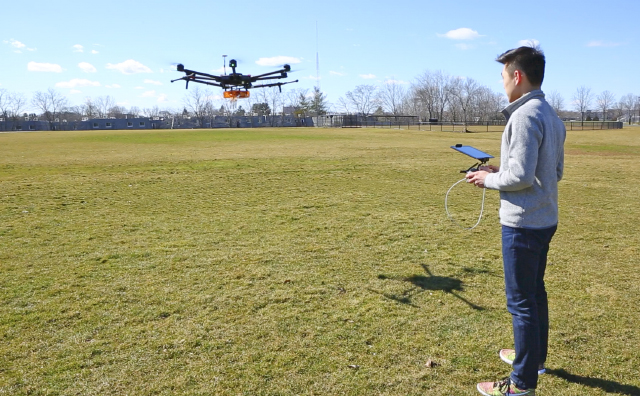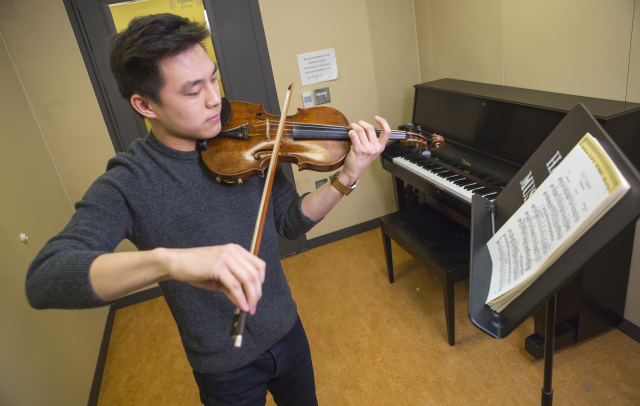News
Daniel Wang, S.B. '17, a mechanical engineering concentrator, works on his senior thesis project, a gas-sampling instrument that could be attached to a drone. (Photo by Eliza Grinnell/SEAS Communications.)
With a passion for aerospace and an interest in drones, the sky (or maybe outer space) is the limit for this mechanical engineering concentrator.
Why did you decide to concentrate in mechanical engineering?
When I was a child, my family lived near the old Northrup Grumman factory on Long Island, which is where they used to develop the F-14 Tomcat, and I was fascinated by aviation and how airplanes are made. I found the idea of conceptualizing something so big and complex, and then actually building a product you can deliver to people, extremely empowering. That inspired me to pursue mechanical engineering in college.
Have you had any opportunities to work on aviation-related projects at SEAS?
In Engineering Design Project (ES 96), I worked with a team of students that designed an atmospheric detector for molecules in the atmosphere. We were essentially designing an instrument that NASA will attach to a weather balloon and launch into the troposphere to collect air samples. Having a life-long interest in aviation and space, the opportunity to collaborate with NASA on a project was extremely exciting.

Wang tests a drone in a Cambridge park to see how his gas-sampling device prototype affects its flight. (Photo by Eliza Grinnell/SEAS Communications.)
As a space enthusiast, what was it like to intern at SpaceX?
I was working on the quality assurance team, so I was interfacing a lot between SpaceX’s engineers who were building the rocket and the crew capsule and our customers, who were typically from NASA or the Air Force. I worked on a tool that could automate the annotation of engineering blueprints. These blueprints have a lot of important material conditions and dimensional callouts, and typically a technician would have to go through these drawings and annotate the important ones, which could take two or three hours. The software tool I worked on would automate that process. But the coolest part of the internship was that the Falcon 9 rocket was being assembled a few hundred feet from my desk, so I could watch it being constructed.
You are also the founder of the Boston Apparel Company. Tell us how you got started with that initiative.
During my freshman year, I joined Harvard Student Agencies, which is a collection of student-run businesses. I worked in the Harvard shop as an inventory manager, so I was sourcing t-shirts and distributing them to our stores. During that summer, I realized a lot of our customers also wanted MIT goods, Boston Red Sox gear, and other local apparel. I started working on my own web store, since I realized I could create a great website and beat out the competition in terms of pricing. That became the Boston Apparel Company. After working on it for a year, I passed it on to another student in the HSA to run full-time.
What did you learn from that experience?
I learned to fail early. I spent a lot of time trying to perfect this website and create the best items, but in reality, it’s really hard to gauge what customers want until you actually deliver a product. I learned to get something that was a minimum viable product, and test it, and push it out, and then make iterations and improve on the design based on customer feedback.

In addition to his engineering work, Wang is an avid violinist who has performed with the Harvard-Radcliffe Orchestra. (Photo by Eliza Grinnell/SEAS Communications.)
What is your senior thesis project?
My project is a small gas-sampling instrument that could be attached to a drone. It is designed for collecting gas samples to analyze emissions and uptake of volatile organic compounds in the Amazon rainforest. Right now, the only way to really measure those harmful compounds is through stationary towers in the forest or with planes flying overhead. My idea is to attach a small instrument to a drone and then fly autonomously above the rain forest, sampling at previously unexplored spatial and temporal scales.
While you’ve pursued your interest in aviation and engineering, you’ve also continued to make time for your favorite hobby, playing the violin. What’s it been like to play at Harvard?
Playing at Harvard has been an incredible experience since there are so many amazing musicians on campus. I started playing violin when I was 6 years old, and I played all through high school. I joined the Harvard-Radcliffe Orchestra my freshman year, and it was great to meet wonderful musicians from around the country who share a common love for music. The level of playing is incredibly high, and it is definitely tough to balance with an engineering workload. But I remember leaving every rehearsal feeling so much better. Even if I had a problem set due that night, I always came away from a rehearsal feeling renewed.
Meet Daniel
Name: Daniel Wang
Class: 2017
Hometown: East Meadow, N.Y.
Concentration: Mechanical engineering, secondary in computer science
Hobbies: violin, playing ultimate Frisbee, exploring Boston and trying new Italian restaurants
Fun fact: Wang traveled to China to see a Fitbit manufacturing facility during a summer internship.
Daniel Wang, S.B. '17, drone mounted climate monitor
Cutting-edge science delivered direct to your inbox.
Join the Harvard SEAS mailing list.
Press Contact
Adam Zewe | 617-496-5878 | azewe@seas.harvard.edu
